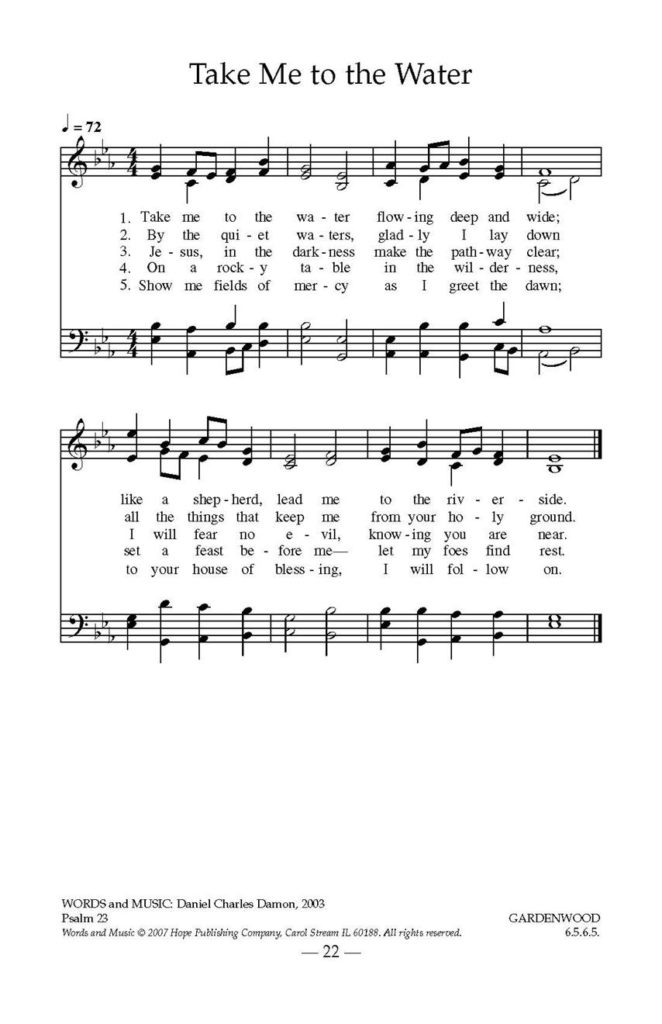Psalm 23 gives us a wonderful example of God’s attention and protection in images that require imagination, but for the contemporary mind, the background of this image may be unknown. The image of the shepherd is actually a metaphor for royalty in the ancient Near East. Then let David say, “The Lord is my shepherd,” it involves more than a beautiful pastoral metaphor; said, “The Lord is my shepherd king. “Therefore, David sings in this psalm about the divine king who guides and supports him, and this is seen for the first time in verse 2. Using the pastoral metaphor, David observes what God is doing for him:?It makes me rest in green pastures, take me to the waters of rest?Looking closely at the language of this verse, it is clear that God’s care for His people is vast and complete.
In Hebrew, the text literally reads: “In grass fields, it makes me lie down; To the calm waters, he guides me?In the semi-arid landscape of ancient Palestine, the meadows were not abundant. The shepherds should guide their flocks to places with enough grass for their sheep, the shepherd needed to know where to go, what was the best way to go and the pace at which the herd had to lead, there would probably be dry and difficult ground to cross, as well as countless dangers of beasts and thieves along the way.
Christ as the Good Shepherd takes care of us all the way, supporting us every step of the way, every season.
This reality underscores the greatness of God seen in this verse. Grass fields? It emphasizes God’s abundant provision. The word translates as? Fields? It means pastures and suggests something like green meadows. Gram? (translated as “green” in ARA) further emphasizes the abundance of design. The word often refers to lush and abundant spring grass after the rainy season has watered the earth (Deut 32. 2, 2Sm 23. 4). Therefore, the phrase conveys the image of fields of fresh and abundant grass. After a long and exhausting journey, there is no better destination imaginable. The text also reveals the centrality of God’s actions. Language uses causative verbs: “It makes me rest. ” The pastor king sovereignly guides David to this abundance and gives him a place to live. This idea of direction is related to the general theme of “Refugio?”in the psalter, which is also present in the rest of the psalm (23: 5-6). provides a safe place for David to receive the provision he desperately needs.
But David’s description of the Lord’s character is not complete. The parallel statement in this verse produces another picture of God’s concern for his people. David literally says, “Take me to the waters of rest. ” Water supply is essential for life, especially for a herd in arid and difficult lands. A place of calm water (that is, without living water) would be the perfect setting for the Shepherd to drink and wash the sheep, but it was also a place where he could clean and heal the wounds the sheep had sustained during the rampage. travel. In particular, the language of God that guides David in this verse is found in other parts of the Old Testament (Ex 15:13; Ps 1,3; Is 40,11; 49,10), and in this verse he emphasizes the escort protector of the Lord to carry his servant? break?. This sentence is often translated as? Soft? or “quiet”, highlighting the calm of the waters. While this is a very good way to interpret this verse, it is important to note that the translated word? Break? it is actually a Hebrew name and is the last word of the expression “still waters. ” Does that imply that? Break? in fact it is the decoration of the waters and the place where they meet. In the Old Testament, the word “rest” often refers to Canaan as a place of rest for Israel (Deut 12. 9; 1R 8. 56; Is 11. 10) and the dwelling place of God (Ps 95. 11; 132). . 8, 14; is 66. 1). This suggests that the Lord Himself is the place of “rest”. given Psalm 23. 2, and the end of the Psalm (v. 6) confirms this idea. Therefore, the ultimate resting place for God’s people is God Himself.
This verse from Psalm 23 presents to God’s people the wonder of the abundant provision (material and spiritual) we have in His Son, the Good Shepherd. When we pray, “Give us our daily bread today. “(Mt 6:11), is based on the reality that Jesus, our sovereign king, guides us through this life, providing us with all that is necessary for every day and for eternal life itself, all that we need so far has come from his hand (vv 31-34), and will continue to provide us until the day he introduces us to the eternal provision of his rest. Christ, like the Good Shepherd, takes care of us on the way, supporting us at every step, in every season. And when, let’s move on to the waters? As soon as he dies, Christ will be with us (Is 43:2), and he will lead us to the abundant pastures, to the “Land of Emmanuel”.

